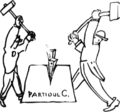Democratic Centralism facts for kids
Democratic Centralism is a political idea that was very important in the Leninist style of government, especially in countries like Russia when the Bolsheviks were in charge. It means that once a political party has discussed an idea and made a decision, everyone in the party must agree with that decision and support it. After the decision is made, no more discussion or disagreement about it is allowed. Joseph Stalin used this idea a lot to help him become very powerful in the 1920s.
Contents
What is Democratic Centralism?
Democratic Centralism is a way for a political party to make decisions and then stick to them. It has two main parts: "democratic" and "centralism."
How it Works
The "democratic" part means that members of the party can discuss ideas freely before a decision is made. They can share their opinions and argue for what they believe is best. This discussion is supposed to happen openly within the party.
The "centralism" part means that once a decision is voted on and made, everyone must follow it. Even if someone disagreed during the discussion, they must now support the final decision. This creates a strong, unified party that acts as one. It means that once a rule is set, everyone has to follow it without question.
Its History and Use
This idea was first developed by Vladimir Lenin, who was a key leader in the Russian Revolution. He believed it was important for his party, the Bolsheviks, to be very organized and disciplined.
Lenin's Ideas
Lenin thought that for a revolution to succeed, the party needed to be strong and united. He believed that if members kept arguing after a decision was made, the party would become weak. So, Democratic Centralism was a way to make sure everyone worked together towards the same goals. It helped the party act quickly and powerfully.
Stalin's Rule
Later, Joseph Stalin used Democratic Centralism in a much stricter way. He used it to get rid of anyone who disagreed with him. Under Stalin, the "democratic" part of the idea, where people could discuss freely, almost disappeared. Instead, it became mostly about "centralism," where decisions came from the top, and everyone had to obey without question. This helped Stalin gain total control over the party and the country. He used it to silence any opposition.
Why is it Important?
Understanding Democratic Centralism helps us learn about how some political parties have been organized. It shows how a system designed for unity can also be used to limit freedom of speech within a party. It highlights the importance of open discussion and debate in any group or government. This idea has shaped the history of many countries.
Images for kids
See also
 In Spanish: Centralismo democrático para niños
In Spanish: Centralismo democrático para niños
 | Janet Taylor Pickett |
 | Synthia Saint James |
 | Howardena Pindell |
 | Faith Ringgold |


